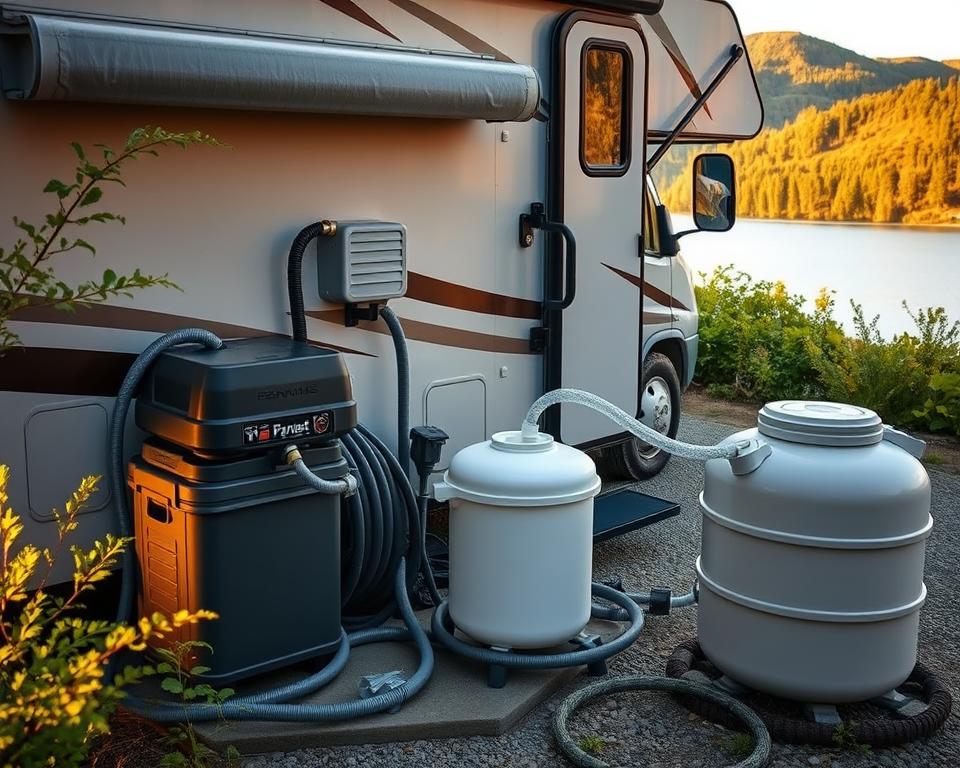RV Waste Pump: Key Service Guidelines
Is your RV’s black water pump really set for the highway, or might it lead to camping woes? Maintaining your motorhome’s waste system in prime condition is critical. It lets you avoid unpleasant aromas, clogs, and expensive damage. Below are key advice to guarantee your sewage pump operates seamlessly, making your travels trouble-free.
Understanding Your RV’s Plumbing System
The RV plumbing system is crucial for any pleasant excursion. It breaks down into two main parts: the black water system and the gray water system – grey water tank pump. The black water system captures waste from the toilet, while the gray water system deals with wastewater from sinks and showers.
The systems employ drain lines that direct toward different tanks, designed for streamlined waste management. Each tank has a vent to prevent gas from building up, guaranteeing the operation is safe and pleasant. Proper waste management in an RV is critical to sidestep leaks or bad odors. By understanding both black and gray water tanks, RV owners can look after and manage waste better.
Understanding how your RV’s plumbing works helps spot issues before they worsen. Consistent maintenance keeps journeys easier for everyone. Staying ahead with your RV’s plumbing system assures reliability during your travels.
Kinds of RV Water Tanks
Owning RVs involves understanding the different tanks. Each one is crucial to your RV’s performance, needing regular upkeep.
The fresh water tank stores consumption water. It’s essential for a convenient RV experience.
The gray water tank gathers sink, shower, and other non-Septic wastewater. Handling this tank keeps your RV clean while traveling. The black water tank, on the other hand, contains toilet waste. It needs frequent emptying and attentive maintenance to avoid issues.
By understanding the fresh, gray, and black water tanks, RV owners can optimally control their systems. This strategizing and regular maintenance deliver smooth operation of the waste management system.
How RV Black Water Tanks Work
The operation of the black water tank is crucial in RV waste management. It receives waste from the toilet via a gravity-fed system. Upon flushing, waste and water are channeled to the tank, to be stored until removal is necessary. It’s critical to keep water levels optimized in the toilet to prevent solid waste buildup.
Knowing how RV waste tanks function can sidestep clogs and odors. Without proper care, solid waste hardens, creating blockages and emptying difficulties. Comprehensive tank flushing techniques are key to preventing these issues, ensuring smooth functionality.
Regular inspection of tank mechanics is advised for RV owners. This includes observing flushing methods and maintaining adequate water flow. Mastering these essentials supports efficient tank maintenance, heading off expensive fixes later.

Crucial Maintenance Tips for Your RV Black Water Pump
Doing regular maintenance on your RV’s black water pump is essential. Kick off by using RV-safe toilet paper to cut down clogs and improve flow. A deep flush can clear waste and reduce bad smells. Routinely cleaning the tank helps halt residue buildup, guaranteeing your RV hygienic and comfortable.
Perform frequent inspections to examine your pump’s condition. Inspect for any signs of wear or damage that could reduce its function. Using specialized tank treatments, like those from All in Sanitation, can greatly raise both performance and cleanliness. Applying these tips can prolong your pump’s life and improve your RV’s living conditions.
Select Camper-Safe Toilet Paper
Maintaining your RV’s black water system demands crucial measures. One essential tip is using RV-safe toilet paper for clog prevention. This specialized product breaks down quickly in water, ideal for RV sanitation systems.
RV-safe toilet paper is crucial for tank maintenance. It dissolves fast, preventing blockages from slow-decomposing materials. This enhances waste disposal efficiency and keeps the plumbing trouble-free.
Choose brands marked as RV-safe when buying toilet paper. These products reduce clog risks and boost your black water tank‘s lifespan by sidestepping buildup. Continual use guarantees a stress-free camping experience, void of plumbing troubles.
Thorough Tank Flushing
Thoroughly flushing your black water tank is essential for responsible waste management in your RV. To aid waste movement, confirm the toilet bowl is adequately filled before flushing. Many RVs are equipped with built-in tank flush systems to make the process more streamlined. For RVs without this feature, employing tank rinsers that attach to the sewer outlet offers a practical alternative.
Correct tank flushing aids waste removal and wards off solid accumulations and bad smells. Maintaining this process ensures your RV stays odorless, making your travels more agreeable. A habit of regular and complete tank flushing will boost hygiene and the overall condition of your RV’s plumbing system.
Prevent Build-Up with Regular Cleaning
Maintaining your RV’s black water tank unclogged is essential for its optimal function. Frequent cleaning washes away lingering waste inside the tank walls. This means flushing well with water and using specific RV tank cleaners for tough deposits.
By cleaning faithfully, you halt odors and minimize clog risks. A spotless tank makes RVing better and helps your plumbing last longer. Add tank maintenance into your routine to secure smooth travels.
Picking Suitable Additives
Opting for appropriate chemicals for RV black water pump maintenance is critical for managing waste and minimizing smells. Many RV enthusiasts employ enzyme-based RV holding tank treatments. These products contain good bacteria to degrade solids and neutralize bad odors.
Shunning harsh chemicals is critical to prevent damage to your plumbing. Such substances can corrode pipes, leading to expensive repairs and diminishing your RV enjoyment. Employing safe chemicals for odor control protects your tank and pump’s longevity.
Keeping your RV black water tank in peak form enhances your travel experience. Using the right holding tank treatment consistently makes sure your system works well.
Regularly Emptying Your Tank
It’s crucial to empty your RV’s black water tank at the right time for effective disposal. Try to empty when the tank is about two-thirds full is prudent. This stops solid waste buildup, delivering a smoother emptying process.
Disposing waste at designated stations is key for safe, eco-friendly waste handling. It’s vital to watch the tank‘s levels closely. Letting it max out can create clogs and make disposal more difficult.
Proper timing and methods are vital for hygienic waste management and can increase your plumbing’s life. Maintaining steady oversight and caring for the system well ensures a pleasant RV living experience.
Inspect and Maintain Seals
Checking seals around the toilet and tank is important for leak prevention. Over time, these seals might wear, leading to odors and potential harm. A careful inspection will show any wear or damage. Detecting issues early enables quick replacement to ensure a secure connection and odor-free RV.
Holding a bit of water in the toilet bowl assists in preserving seal condition. This safeguard is critical in RV seal upkeep. It increases the seals’ life, preventing leaks and foul odors.
Periodic seal maintenance can stop hefty bills later. By focusing on seal health, RV owners ensure a pleasant journey.
Extra Strategies for Ongoing Upkeep
Scheduling professional servicing for your RV at least once a year is smart, particularly for black water tank care. This strategy aids in spotting issues sooner and maintains your plumbing system’s integrity.
When getting your RV for storage, thoroughly clean and empty the black water tank first. Think about antifreeze to protect from damage from remaining water during cold seasons. Taking this step is essential for protecting the system, ensuring it’s ready for your next adventure.
Steady reviews and preventive actions are crucial to extending your sanitation system’s life. Observing connections, hoses, and seals ensures smooth operations. This approach improves your RV experience, making it enjoyable all year round.
Securing your RV’s black water pump is well-maintained is vital for a stress-free camping journey. By sticking to the maintenance tips shared, you can maintain your black water system operating flawlessly. It’s essential to focus on routine washing, applying correct flushing methods, and picking appropriate chemicals for waste management.
By meeting these maintenance requirements, you will prevent unpleasant odors and blockages. This also increases your RV plumbing system’s durability. Proactive care of the RV black water pump means more time enjoying the outdoors, minus potential setbacks.
Don’t forget, proper upkeep is key next time you gear up for an outing. It’s not the highlight of RV ownership, yet it significantly betters your travel experience.

